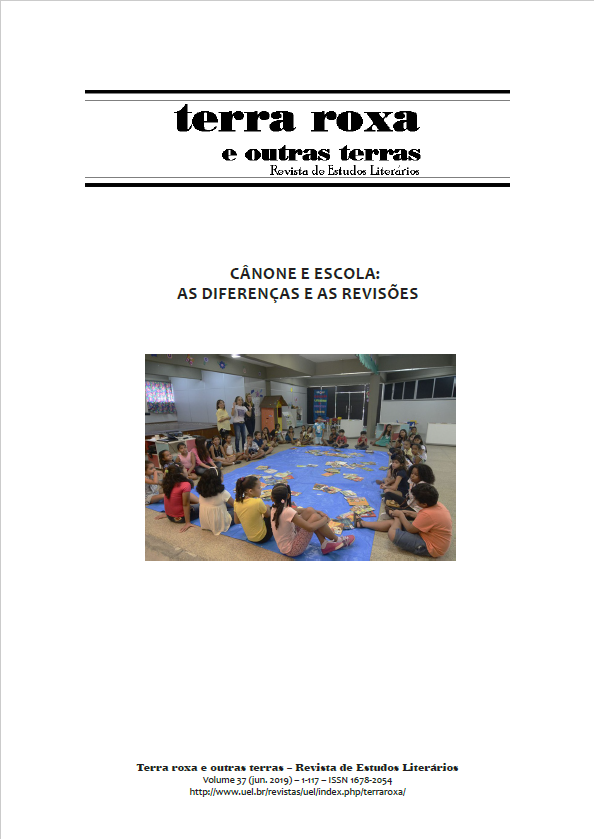Children’s literature in formal and no-formal educational contexts: the flight technique
DOI:
https://doi.org/10.5433/1678-2054.2019v37p67Keywords:
Children’s literature, Formal And non-formal educational contexts, Literaty educationAbstract
This article discusses the problem of children’s literature in formal and non-formal educational contexts, highlighting the role of the adult-mediator in the promotion of aesthetic pleasure and reading comprehension, taking into account the levels of reading development and the experiences of the young reader. We advocate that the adult must be free to select the books that he considers most appropriate to work with children, despite the legal constraints regarding the ministerial directives embodied in the program documents and in the curricular guidelines for his educational and pedagogical practice. The aim is to demonstrate that the teacher should not only adhere to the didactic approach of obligatory works that guide his teaching practice, but he should go further, selecting texts and authors that seem relevant to him to instill the reading skills and enhancing the literary education of the young reader, so that he will gradually become competent and critical, capable of extracting plural meanings from the works that are preferentially directed to him or from those that he appropriates himself through the affective relationship with the act of reading.Downloads
References
BUESCU, H. et al. Programa e Metas Curriculares de Português do Ensino Básico. Lisboa: Ministério da Educação e Ciência, 2015.
CERVERA, J. Teoria de la Literatura Infantil. Bilbao: Mensajero, 1991.
MENDES, T. Vozes e Silêncio: a Poética do (Des)encontro na Literatura para Jovens. Lisboa: Bubok, 2015.
MERGULHÃO, T. Literatura Infantil e a técnica do voo. PROFFORMA, n. 03, 2011. Disponível em: <http://www.cefopna.edu.pt/revista/revista_03/pdf_03/es_04_03_v2.pdf>
MORAIS, J. A Arte de Ler – Psicologia cognitiva da leitura. Lisboa: Cosmos, 1997.
PENNAC, D. Como um Romance. 11. ed. Porto: Asa, 1999.
REDES, L. A educação literária nos novos programas de Português do ensino básico. Disponível em <https://www.app.pt/6589/a-educacao-literaria-nos-novos-programas-de-portugues-do-ensino-basico/>. Acesso em: 14 de maio de 2018.
SILVA, I. (coord.). Orientações Curriculares para a Educação Pré-escolar. Lisboa: Ministério da Educação/Direção-Geral da Educação, 2016.
SILVA, S. Das palavras às ilustrações: uma leitura de O Nabo Gigante e de João e o Feijoeiro Mágico. Disponível em <http://www.casadaleitura.org>. Acesso em: 21 de maio de 2018.
SIM-SIM, I. A formação para o ensino da leitura. Disponível em <http://www.casadaleitura.org>. Acesso em: 29 de maio de 2018.
VELOSO, R. A leitura Literária. Disponível em <http://www.casadaleitura.org>. Acesso em: 10 de maio de 2018.
VYGOTSKY, L. A Imaginação e a Arte na Infância. Lisboa: Relógio D’Água, 2009.
Downloads
Published
How to Cite
Issue
Section
License
Copyright (c) 2019 Terra Roxa e Outras Terras: Revista de Estudos Literários

This work is licensed under a Creative Commons Attribution 4.0 International License.
Authors who publish in this journal agree to the following terms:
a) The authors retain the copyright and grant the journal the right of first publication, the work being simultaneously licensed under the Creative Commons Attribution-NonCommercial 4.0 International License, allowing the sharing of the work with acknowledgment of the authorship of the work and initial publication in this journal.
b) Authors are authorized to assume additional contracts separately, for non-exclusive distribution of the version of the work published in this journal (eg, publish in an institutional repository or as a book chapter), with acknowledgment of authorship and initial publication in this journal.
c) Authors are allowed and encouraged to publish and distribute their work online (e.g. in institutional repositories or on their personal page) after the editorial process, as this can generate productive changes as well as increase impact and citation of the published work (See The Effect of Open Access).
d) The authors of the approved works authorize the journal to, after publication, transfer their content for reproduction in content indexers, virtual libraries and the like.
e) The authors assume that the texts submitted for publication are of their original creation, taking full responsibility for their content in case of any objection by third parties.



















